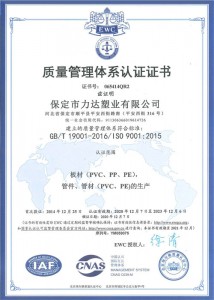Dec . 12, 2024 06:06 Back to list
hdpe pipe drip irrigation
The Advantages of HDPE Pipe in Drip Irrigation Systems
Drip irrigation has revolutionized the way we approach water management in agriculture, particularly in arid and semi-arid regions. One of the most significant advancements in this field has been the use of High-Density Polyethylene (HDPE) pipes. Known for their durability, flexibility, and resistance to various environmental factors, HDPE pipes are becoming the preferred choice for drip irrigation systems.
Enhanced Durability
HDPE pipes are known for their exceptional durability. They can withstand harsh weather conditions, exposure to chemicals, and extreme temperatures without degrading. This durability ensures a longer lifespan for the irrigation system, reducing the need for frequent replacements. Unlike traditional materials, such as PVC or metal, which may corrode or become brittle over time, HDPE maintains its integrity, making it a cost-effective solution in the long run.
Flexibility and Lightweight Design
Another significant advantage of HDPE pipes is their flexibility. This flexibility allows for easier installation, particularly in fields with uneven terrain or complex layouts. The lightweight nature of HDPE pipes simplifies transportation and handling, which can be particularly beneficial for larger agricultural operations. Farmers can quickly set up or modify their irrigation systems without the need for heavy machinery, saving both time and labor costs.
Resistance to Biological Growth
hdpe pipe drip irrigation

Drip irrigation systems rely on precise water delivery to crops, and any blockage can lead to significant yield losses. HDPE pipes have a smooth inner surface that reduces the likelihood of biological growth, such as algae or bacterial buildup, which can clog the system. This property is crucial for maintaining consistent water flow, ultimately leading to healthier crops and better agricultural outcomes.
Environmental Benefits
Using HDPE pipes in drip irrigation systems also aligns with sustainable agricultural practices. Drip irrigation is already a water-efficient method, significantly reducing the amount of water wasted compared to traditional irrigation methods. When combined with HDPE pipes, this system becomes even more efficient. The ability of HDPE to resist leaks and fractures means that water is delivered directly to the root zone of plants, minimizing evaporation and run-off. This efficient water use is increasingly vital given the growing concerns over water scarcity in many parts of the world.
Cost-Effectiveness
Although the initial investment in HDPE pipes may be higher than that of traditional materials, the long-term cost savings are undeniable. The reduced need for repairs and replacements, coupled with the efficient water use, enhances the overall profitability of agricultural operations. Farmers can achieve better yields with the same or less water input, ultimately leading to increased revenues.
Conclusion
In conclusion, HDPE pipes offer a plethora of advantages for drip irrigation systems, making them an optimal choice for modern agriculture. Their durability, flexibility, resistance to biological growth, and environmental benefits contribute to more efficient and sustainable farming practices. As global water resources become scarcer and the demand for food rises, incorporating advanced technologies such as HDPE pipes into irrigation practices will be crucial for ensuring food security for the future. Embracing these innovations helps farmers not only to survive but to thrive in an ever-changing agricultural landscape.
-
High Quality PVC Rigid Sheet (Embossed Surface) for Industrial Use
NewsJul.25,2025
-
High Quality PVC Soft Sheet for Flexible Applications | Durable & Customizable
NewsJul.24,2025
-
High-Quality UPVC Water Supply Pipe for Durable Plumbing Solutions
NewsJul.23,2025
-
High-Quality PVC-M Water Supply Pipe for Reliable Plumbing Solutions
NewsJul.22,2025
-
High-Quality PVC Transparent Pipe with Clear Visibility & Durability
NewsJul.22,2025
-
Premium Wireless Headphones: Noise Cancelling & Long Battery | Order Now
NewsJul.21,2025

